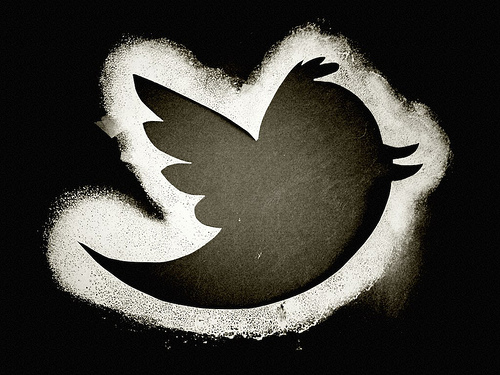 The tech-blogosphere is abuzz about the rumor that Twitter is talking to both Google and Microsoft about licensing a full feed of tweets. Kara Swisher broke the news into the echo-chamber:
The tech-blogosphere is abuzz about the rumor that Twitter is talking to both Google and Microsoft about licensing a full feed of tweets. Kara Swisher broke the news into the echo-chamber:
Twitter is in advanced talks with Microsoft and Google separately about striking data-mining deals, in which the companies would license a full feed from the microblogging service that could then be integrated into the results of their competing search engines.
I was speaking to HubSpot developer, Dan Abdinoor, this evening while he was spanking me in a ping-pong match. He's currently working on a handful of enhancements to our social media monitoring tool. Like 100s - if not thousands of applications - our tool uses Twitter's API. However, as Dan shared with me, Twitter limits the amount of access applications can get to their feed. Rightly so, as it's expensive for Twitter to let 1000s of applications access an API 24 hours a day.
So, what could Google or Microsoft do if they had full unhindered access to this feed? And why should marketers care?
More Search Engine Traffic for Twitter (And You)!
Ironically, Twitter could get the deal of a century with this arrangement. If Google and Bing simply display relevant Tweets when users do keyword searches at Google.com or Bing.com, Twitter might get lots of traffic. (According to Alexa, Google already sends Twitter about 10% of its traffic.) If Google and Bing are willing to pay for the right to index and send more traffic to Twitter, the rest of the world will be pretty jealous. Especially the newspaper industry who's been complaining that Google makes a lot of money off their backs.
But, what does it mean for marketers?
It means that if you're not using Twitter for marketing and PR yet, you better start. If keyword-rich tweets are displayed on Google and Bing.com, and you're not tweeting, you stand to get none of the increased traffic destined to go from Google to Twitter to ... ? (ie Not you.)
The Search Engines Might Mine The Data to Find Your Industry's Influencers. Then, Use that to Change Regular SERPs.
I've written many articles on the proper way to build links. However, I also know many informed SEO consultants that still buy links, even though it is in violation of Google's Terms of Service. Many get away with it. It's a broken system -- or a rule that everyone knows can be bent. And it keeps Google from ensuring that the absolute best, unbought, editorially-earned results are presented to searchers.
Google and Bing could shift reliance away from links on the web, currently as much as 75% of the reason why one site might rank over another for a given keyword. (See SEO 101.)
With access to Twitter's full feed, they could determine which users people trust. They could add a variable in their algorithm that values the links to external sites that are posted in a trusted authority's tweets. This analysis could get pretty sophisticated as HubSpot's Dan Zarella, has shown with his Retweet research:
Zarella said people love to retweet new blog posts from users they follow. They also love retweeting content containing links and don't mind being asked for a retweet. Finally, retweets have a snowball effect; a retweeted tweet is more likely to be retweeted again by other users.
These retweets are an obvious form of an endorsement of quality.
So, what should marketers do? Start connecting with influencers in your industry. Do keyword searches on http://twitter.grader.com/search and find the influencers relevant to your business. Start sending them resources, responding to their tweets and doing whatever it takes to form relationships. You'll need them to know about the content you're creating, find it interesting and hopefully ... retweet your stuff.
Real Time Search Might Actually Go Mainstream. Are you Publishing in Real Time? Are You Reacting in Real Time?
I check Techmeme 4 times per day for tech news. Many people keep one eye on Twitter at all times and all day long. If you can relate, you are among the tragically-connected internet-addicted too.
As indicated by the 50 articles written about this rumor in the span of a few hours, the worlds of news reporting and public reaction are no longer distinct. They are two things that have come together in one indiscernible blob of chatter. Many people call this "real time".
It might not matter that you're not participating in the real time conversation right now. But, if Google and Bing start sending their millions of searchers to read and react to millions of conversations, you better get involved.
If you're worried about a blog post talking smack about your business or product, then you'll have a heart attack if Google invites hordes of un-Twitter-initiated searchers into the un-encumbered conversation.
So what should marketers do? Get into the conversation. Start a business blog. Build your Twitter followers and blog subscribers, so that you can participate in the conversation and they can help you amplify your positive messages above the negative and the noise.
Rumors and Prognostications.
Since this is just a rumor and I am just guessing what they might do with the data, you can pretty easily dismiss all of this advice. But, you'd still be missing a big opportunity. Used right, Twitter can provide a lot of value to your inbound marketing strategy. Start by watching our Twitter for Marketing and PR recorded webinar.
Free Inbound Marketing University Online Training Program
|
|
Download HubSpot's Inbound Marketing University online training program
IMU includes 11 free webinar classes and notesheets. The program drills into each component of inbound marketing and prepares you for the Inbound Marketing certification exam.
|




![What Is Dark Social? [FAQs]](http://cdn2.hubspot.net/hub/53/file-386319952-jpg/Blog_Thinkstock_Images/dark_social.jpg)
![Analyze Twitter Data for Any Search Term [Free Tool]](http://cdn2.hubspot.net/hub/53/file-23153909-png/blog/images/tweet-chartsb.png)
